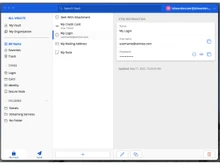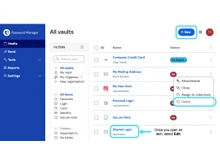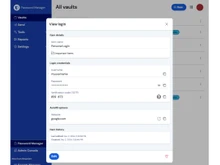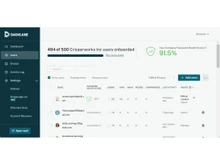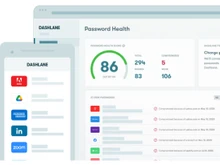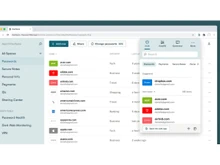These days, organizations rely largely on reliable password managers to keep their data secure. Consequently, having a strong password manager is crucial. Dashlane and Bitwarden are two of the most popular password managers.
Both are reliable password management solutions designed to assist you in protecting sensitive data and keeping your passwords secure. You can retain encrypted file attachments, auto-fill web forms, and do so much more with them.
Here, we will thoroughly compare the two password managers to find out the major differences and to know which one is better. We will review their security solutions, available features, user interface, price, cross-platform availability, and more to understand which one is better.
Bitwarden vs Dashlane: An Overview
Both Bitwarden and Dashlane are trustworthy password managers that offer a variety of amazing features.
Dashlane is more than just a password manager; it's a secure platform for any type of sensitive information you wish to save. The diversity of data entries you can save in Dashlane's vault serves as evidence of that. Additionally, the commercial edition of Dashlane checks the dark web to make sure your information hasn't been compromised, notifies you of any data breach, and analyses passwords to detect weak and/or duplicated keys.
Bitwarden, being an open-source password manager, is quite popular among people. You can self-host your vault for free and store an unlimited number of entries. It also supports device syncing. The firm only maintains encrypted information in its servers because Bitwarden locally protects your data via AES-256 encryption.
Bitwarden and Dashlane: Pros & Cons
- Dashlane offers VPN and dark web monitoring, but Bitwarden or any other Dashlane alternatives don't.
- A biometric recovery option is offered by Dashlane but is not present in Bitwarden.
- The local hosting feature (storing of data locally) is supported by Bitwarden, which isn’t supported by Dashlane.
- Dashlane’s passkey technology ensures a password-less experience while logging into any website. This is not supported by Bitwarden.
Bitwarden vs Dashlane: In Terms of Features
Dashlane offers features like password & account recovery, password sharing, detail autofill, etc. However, these features are either missing or are limited in Bitwarden.
- Password & Account Recovery: You can designate an emergency contact in Dashlane, and if you forget your master password, that person will get access to your account. On iOS and Android devices, you can also reset it using biometric information. On the contrary, Bitwarden only provides one method for account recovery. When you register, you'll be given a special code that you should keep safe and use to reclaim access to your account. Your data will be lost if you lose it.
- Password Generator: Both Dashlane & Bitwarden auto-generate unique passwords for you. Apart from that, they both enable you to customize the generated password. You can customize the length of the password and change characters or symbols. You can also opt for digits, symbols, and capital letters to strengthen the password. The main distinction is that Bitwarden provides 14-character passwords. Dashlane, however, is set to create passwords that are 12 characters long by default.
- Password Sharing: Dashlane's free edition enables you to share sensitive information with up to 5 other users. You can buy a Premium version if you want to share the information with more than 5 users. On the other hand, Bitwarden doesn’t offer this feature in its free edition. However, the Family package allows you to share a password with 6 other people.
- Autofill: Dashlane identifies web forms and fills in your details smoothly including your name, credit card details, email, phone number, etc. without asking for any login. However, in Bitwarden, you need to manually click on icons to select the details that you want to enter.
Comparison of Bitwarden vs Dashlane in Terms of Pricing
- Free Trial: Bitwarden offers a free trial, which includes unlimited passwords, unlimited devices, core functions, Bitwarden Vault, etc. Dashlane, on the other hand, also offers a free trial in which it offers unlimited passwords, 1 device, and a secure sharing option.
- Paid Plans: Bitwarden's Premium plan is $1 per month and the Family plan is priced at $3.33 per month. Dashlane, on the other hand, has plans that are slightly more expensive, i.e., $3.33 per month for the Premium plan, but they also include a VPN. The Family plan costs $5 per user per month.
Therefore, in terms of pricing, Bitwarden is a clear winner as it is quite affordable and offers more or less similar features to Dashlane.
Bitwarden vs Dashlane: User Interface
Dashlane and Bitwarden both use the default macOS menu for navigating. Since Dashlane offers a more attractive effect on the sidebar, it is preferred by all. It blends seamlessly with the current macOS look.
Bitwarden is slightly more secure. The UI is predominantly white with black text. It also supports the Dark theme for those who want it. This is an added advantage as none of the other Bitwarden alternatives offer this kind of flexibility.
Bitwarden vs Dashlane: Encryption & Security
Both Bitwarden and Dashlane offer 2FA & AES-256 military-grade encryption. Dashlane, however, has a built-in VPN to securely safeguard all data. It ensures that you use the password manager without risk even when connected to an unsecured public Wi-Fi.
In short, Dashlane is better than Bitwarden in terms of encryption and security as it also offers an extra layer of security via VPN.
Bitwarden or Dashlane: Data Storage
In both the free and paid versions of Bitwarden, the vault offers unlimited storage. In addition, customers of premium editions receive 1 GB to store encrypted file attachments for personal use, and the family plan offers an additional 1 GB for organizational use.
Dashlane also offers excellent and safe options for data storage. You can store as many passwords as you want in the vault with the free plan. You can also purchase a Dashlane premium or family & friends’ subscription, both of which offer unlimited storage for files and unlimited access to the vault's contents.
Here, the winner is simply Dashlane as it hasn’t put any restrictions on the number of vault items for storage.
Bitwarden vs Dashlane: Privacy Policy
The data you input on Bitwarden's forms, including name, email address, OS model, IP address, device type, and other data, is collected by Bitwarden. It however complies with the CCPA, Privacy Shield, and GDPR rules and ensures that your personal data is treated in accordance with the requirements of privacy laws.
Dashlane gathers data on usage, third-party data, cookies, aggregated data, registration information, master password, feedback, billing details, browser data, and device data. However, it keeps them in a highly encrypted form which makes them safe from outsiders.
In short, Bitwarden is better than Dashlane in terms of Privacy Policy, as it complies with Privacy Shield, GDPR, and CCPA standards.
Bitwarden vs Dashlane: Technical Specifications/Deployment
The operating systems supported by Bitwarden are macOS, Windows, Linux, iOS, and Android. And the supported browser extensions include Vivaldi, Brave, Tor, Safari, Edge, Chrome, Firefox, and Opera.
On the other hand, the operating system supported by Dashlane includes Windows, Linux, macOS, Android, and iOS. The supported browser extensions are Brave, Firefox, Safari, Chrome, Edge, and Opera.
Overall, in terms of technical specifications, Bitwarden is ahead of the game as it supports more browser extensions than Dashlane.
Bitwarden vs Dashlane: Customer Support
Bitwarden offers customer support via email, how-to guides, FAQs, weekly Q&A sessions, and community forums. However, it doesn’t offer any real-time support which is a bit disappointing.
Dashlane also offers customer support via FAQs, how-to guides, a knowledge base, and email support. Apart from that, Dashlane also has 24X7 live support for its customers.
In a nutshell, Dashlane is a better option when it comes to customer support. It provides 24x7 live support, which is not there in Bitwarden.
Which Is Better Bitwarden or Dashlane?
After a complete analysis of both Bitwarden and Dashlane in terms of different factors, we can say that both have their own set of advantages. However, Dashlane is better when it comes to dark web monitoring, VPN, biometric recovery, passkey technology, password sharing functionality, autofill, encryption/security, data storage, and customer support. On the other side, Bitwarden has an edge when it comes to local hosting, pricing, privacy policy, and technical specifications.


 8 Ratings & 3 Reviews
8 Ratings & 3 Reviews






